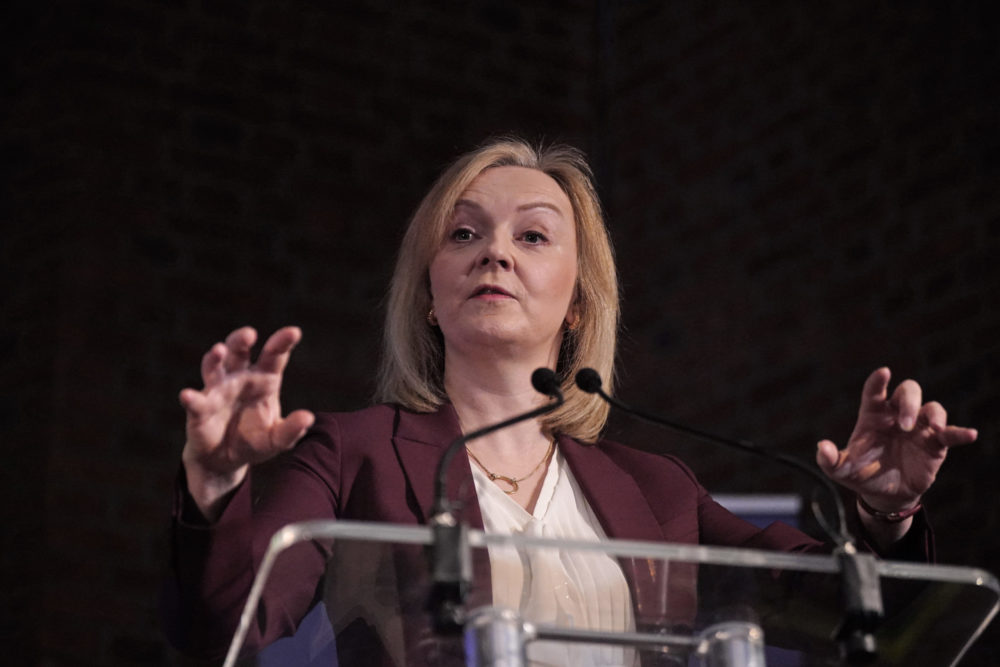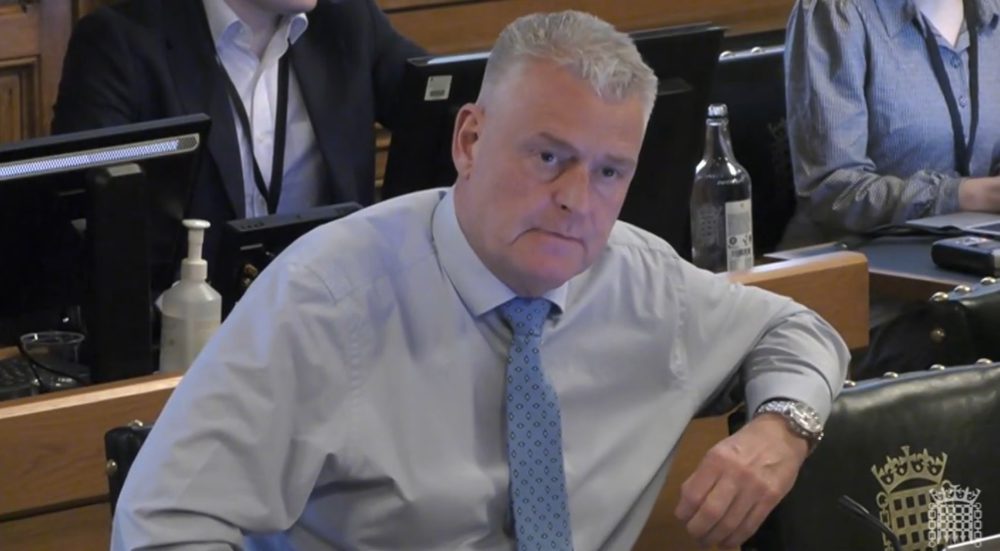Quick, blame the deep state! The tactics at play when Tories spout conspiracy theories

Adam Koper, WISERD Civil Society Post-Doctoral Fellow, Cardiff University
Conservative MPs seem increasingly willing to use the rhetoric of conspiracy. Recently, Liz Truss claimed that her brief tenure as prime minister had been ended by the deep state – shadowy forces within the British establishment and the media.
A few days later, Lee Anderson, the Conservative party’s former deputy chairman, asserted that London’s mayor, Sadiq Khan, is being controlled by Islamists. He was adding his own twist on a similar conspiracy theory put forward by former home secretary Suella Braverman, who claimed in a Telegraph article that Islamists are in charge of the whole country.
Why do politicians make conspiracy claims like these? It seems strange for MPs whose party has been in government for almost 14 years to imply that they aren’t really in control and that power is wielded by hidden actors.
Maybe Truss and Anderson mean what they say, and say what they mean. But even if they do believe that Britain is governed by a deep state or Islamist plotters, knowing a bit about rhetoric can help us to see that there is more going on when politicians use the language of conspiracy.
Context matters
A good politician will adapt what they say to fit the moment and their audience. For example, Truss’s deep state comments were made at CPAC, a conference for American conservatives. She was speaking in part to promote her new book, Ten Years to Save the West, and so had little reason to do anything other than give her audience what it likes. Conspiracy theories have become prominent in American conservatism (think QAnon and the claims that the 2020 presidential election was stolen), so echoing the rhetoric is an obvious way for a CPAC speaker to ingratiate themselves with an audience.
Anderson, though, was speaking in the UK, where conspiracist language is more unusual. His comments were seen by many as deliberately divisive and Islamophobic, and quickly landed him a suspension from his party. That said, government ministers were evasive when asked why his comments were wrong and whether they were Islamophobic.
Part of the brand
Courting controversy carries risks, as Anderson’s suspension shows. But it can also thrust a politician into the limelight, giving them a chance to speak to a broader audience and potentially gain new supporters. Much of the time, politicians make their own character – or ethos, as it is known in classical rhetoric – part of their pitch.
In her comments alleging a deep state conspiracy, Truss took on a populist tone. She portrayed herself as an anti-establishment figure fighting for the British people against the elites. She didn’t mention her party’s long period in government in charge of the civil service that allegedly made her tenure so impossible. Nor did she refer to the economic problems brought about during her fleeting administration.
Speaking to an audience which is likely to be less familiar with her political career, Truss was able to present herself as the protagonist in a David and Goliath narrative – albeit one in which David is defeated.

Similarly, Anderson used the controversy around his comments to present himself as a man of the people. Rather than giving any evidence to back up his claims about Islamists controlling Khan, Anderson instead justified his views by citing the positive reaction he had received from his constituents. When told in an interview with Channel 4 News that people were puzzled by his refusal to back down, Anderson replied: “If you go and speak to people in Ashfield [Anderson’s constituency] and ask them if they’re puzzled about it, no they’re not.”
In the aftermath of the controversy, Anderson told GB News: “When I went into pubs in Ashfield at the weekend, Friday, Saturday, Sunday, I got a round of applause when I went in. And these are normal working-class people.”
Such comments can be seen as part of a broader trend. Politicians have learned to cite the opinions of ordinary people in order to justify spurious claims. Rather than explaining anything about how he came to view Islamists being in charge of London, Anderson’s response to questions has been to use them as an opportunity to present himself as an outsider to the political establishment – a man in tune with what voters really think.
Pitting ‘us’ against ‘them’
This focus on presenting a certain persona and using it to justify baseless comments tells us something important – that identity is a key ingredient in conspiracist rhetoric.
It enables a politician to construct a conflict between an in-group and an out-group – a struggle between “us” and “them” – and asks the audience to pick a side. Rather than focusing on policies or ways of improving life for the British population, this rhetoric wants the audience to identify with the speaker’s character and join them in opposing a threatening enemy.
In this way, conspiracist rhetoric is much like the Conservatives’ attacks on “woke ideology” – it deflects attention away from their record in government, and rallies their supporters against an enemy at a time when the party is down on its luck.
Counteracting this is no easy task. Rhetoric is an art, not an exact science. One strategy could be to focus more on what politicians are trying to achieve when they use conspiracist rhetoric. While it is important to determine whether or not they really believe in a deep state or Islamist conspiracy, we also need to challenge the personas that politicians craft for themselves, as well the us-against-them divisions they construct.
This article was first published on The Conversation
![]()
Support our Nation today
For the price of a cup of coffee a month you can help us create an independent, not-for-profit, national news service for the people of Wales, by the people of Wales.





The party should have booted both out. Truss, at the CPAC, basically endorsing trump who is a danger to the world, if you don’t know who Bannon is you really need to keep up, he is a wrecker of democracy. Anderson, not the sharpest tool in the box but we know what he is. Immediate eviction from the Tory party had they any morals.
ARTD still 30p BFF?
30p trotting off to reform then.
Sadly, people will always be swayed by a convincing narrative, whether or not it is any good for them. Manufacturing consent isn’t it? Witness decades of the UK Right Wing press pumping public discourse full of false anti-EU tropes, Farage standing in front of racist, alarmist posters. All it ever takes is someone who’s prepared to lie to serve their own interests and there are plenty of them about. The depressing part is that so many people are easily led. Bad culture and also the Left must accept culpability in its faliures in this regard too.
If any ‘deep state’ exists in Britain it consists of an unholy mix of oligarchs, newspaper and media barons, very rich corporation bosses and Masonry, – with a few examples of old money and land. Most represented in the Tory party
It is nonsense to say that there is no Deep State. But like lots of hidden things, the inability to identify exactly what they are leads to all sorts of ridiculous claims, such as ‘they don’t exist’ or ‘they are a bunch of secret socialists’. In the end, the elites of this country almost all went to the same schools, the same universities, and the same social clubs. They live in the same enclaves, eat in the same restaurants, and hang out with each other. Whether they run financial services, the media, home office departments, or big businesses, they all… Read more »
One thing is obvious, the Tory Government is an equal opportunity employer like no other, every kind of freak, evil or otherwise is included…
When I think of a deep state, Tories coem to mind. The obsession with English gentry, weird titles and people playing dress up with crowns. Unwilling to be honest and serve us all.
Seeing a shrink should be a legal requirement when putting your name in the political hat…
Nutters, Pervs and Sadists all feel at home in Parliament and all are given a home on the Tory benches…
Some dodgy cult leader in a dark corner of little Britain…mad as a cow with mad cow disease…
She has Blair’s Mad Eye, a lot of the dangerous ones have it, it’s like it really faces inward or transmits to Murdock central, a real give away, others have the stare, like Smiles that intense ‘you will obey me’ stare…Has anyone managed to catch a glimpse of an honest smile cross a politician’s face ever…awful…I once read a book about the mental state of Ignacio de Loyola…not recommended…
I reckon that both 30p lee and liz truss should seek treatment from a psychiatrist for the wildly outrageous claims made by the two. They seem to be displaying symptoms of paranoid schizophrenia.